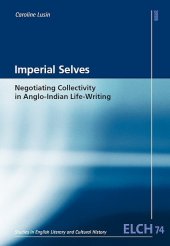 Neuerscheinungen 2018Stand: 2020-02-01 |
Schnellsuche
ISBN/Stichwort/Autor
|
Herderstraße 10
10625 Berlin
Tel.: 030 315 714 16
Fax 030 315 714 14
info@buchspektrum.de |

Caroline Lusin
Imperial Selves
Negotiating Collectivity in Anglo-Indian Life-Writing
Neuausg. 2018. 278 S. 22.5 cm
Verlag/Jahr: WVT WISSENSCHAFTLICHER VERLAG TRIER 2018
ISBN: 3-86821-759-2 (3868217592)
Neue ISBN: 978-3-86821-759-9 (9783868217599)
Preis und Lieferzeit: Bitte klicken
The British Empire is indelibly part of British history, and its legacy still shapes British self-conceptions decisively. The heritage of British India in particular, the celebrated ´Jewel in the Crown´, pervades various aspects of British everyday life and popular culture, ranging from language and food to music and movies. Exploring Britain´s imperial history is hence a crucial step in understanding the state of Britain today.
Anglo-Indian life-writing - the autobiographies, memoirs, diaries, and letters of Britons who spent part of their lives in India - offers revealing insights into how the British conceptualised their relationship to the Empire at the time of their supremacy on the subcontinent between 1818 and 1947. Proceeding from the assumption that life in British India was regulated by an exceptionally tight system of norms and conventions, this study investigates how the British pinned their individual lives in India against various forms of collectivity, including social groups and their normative framework as well as the collective frames of narration.
TABLE OF CONTENTS
I. INTRODUCTION 1
1. Anglo-Indian Life-Writing from 1818 to the Present 1
1.1 Lives and Life-Writing in British India 2
1.2 The Heritage of British India Today 5
1.3 Theoretical Approach, Structure, and Sources 8
2. Theorising Self-Narration and Collectivity 12
2.1 Habitualisation, Institutionalisation, and Social Role 14
2.2 Personal Identity, Collective Identity, and Cultural Memory 18
2.3 Self-Narration and Its Collective Frames 22
II. NEGOTIATING COLLECTIVITY IN ANGLO-INDIAN LIFE-WRITING 32
1. ´With Pen and Pencil´: Paratext and Conceptual Framework 37
1.1 The Conflict of Public and Private 39
1.1.1 Strategies of Dissociation 40
1.1.2 The Author as Historical ´Witness´ 44
1.2 Configuring Anglo-Indian Identity 52
1.2.1 Institutional Identification 53
1.2.2 The Relationship to India 59
1.3 Genre Conventions and Narrative Structure 71
1.3.1 Conventionalised Plots and the Anecdotal Mode 72
1.3.2 Perspective Structure and Experiential Distance 89
2. ´The Usual Assortment´: Social Life and Social Contacts 95
2.1 Social Interaction in Anglo-Indian Society 98
2.1.1 Hierarchy and the Individual 99
2.1.2 Community and Social Routine 108
2.2 Institutions, Codes, and Practices 122
2.2.1 Individual, Institution, and Social Role 125
2.2.2 Transgressive Women and Incorporated Wives 143
3. ´The Exiles´ Line´: History, Tradition, and Continuity 157
3.1 Continuity and Family Tradition 158
3.1.1 Constructing Links to India 159
3.1.2 Autobiography and Family History 165
3.2 Cultural Memory, History, and the Canon 175
3.2.1 Remembering the Indian Mutiny 176
3.2.2 The Frame of European Literature and Culture 191
3.3 Communicating the Anglo-Indian Experience 199
3.3.1 Letters as Lifeline 199
3.3.2 The Editorial Paratext 207
III. ANGLO-INDIAN LIFE-WRITING THEN AND NOW 225
IV. BIBLIOGRAPHY 233
1. Primary Sources 233
2. Secondary Sources 243


